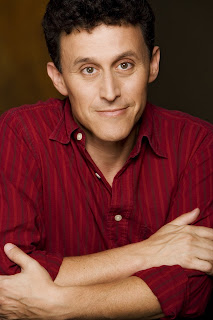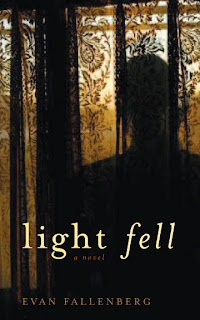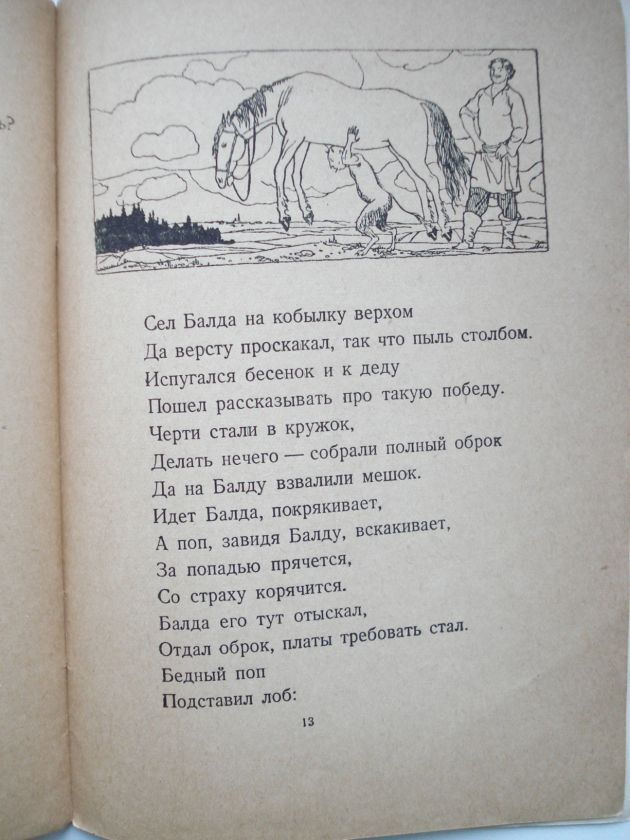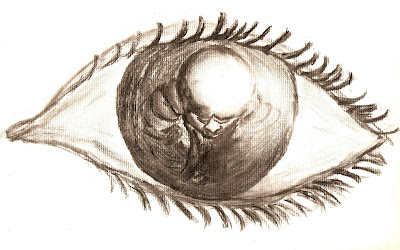
I met author Evan Fallenberg at an MFA residency in Vermont earlier this winter. He was there to give a workshop on translation and is in fact helping the college set up a program in the art. After he left I was perusing the books the local bookseller was peddling at one of the open readings, and I saw his novel,
Light Fell among the titles. Curious, I bought it and proceeded to spend every free moment of the next few days completely absorbed in it.
Light Fell tells the story of Joseph Licht, a literature professor who is about to host a reunion with his with five sons and daughter-in-law for his 50th birthday. With him we look back at how Joseph arrived at the day of this event: his realization about his sexual orientation, his brief and tragic love affair with a married rabbi (I fell in love with Rabbi Rosenzweig too, I have to admit) and the repercussions these self-discoveries bring to his life. We follow Joseph through his struggles with identity, self-worth, spirituality and parenthood, and in the end we are lifted up with him as he achieves tremendous personal growth and rebuilds bonds with his sons.
Besides being beautifully written, the characterization is brilliantly rendered, and the conflicts are so realistic you can physically feel them as you rush to turn the pages. I was so drawn into the complexity of the parent/child relationships, that even after I put it down I continued to think about them, as if they were people I actually knew. In addition, I was impressed with the courage it took to write something that could be considered controversial. When I read the last word of the novel, I held it to my chest and said out loud, “I love this book.” There are few times in my middle-age life this has happened, and I knew I had to interview Fallenberg and help introduce people to this ground-breaking and gorgeous novel.
To give you some background,
Evan Fallenberg , is an Ohio-born writer and translator who has lived in Israel since 1985. In addition to being the author of
Light Fell, his recent translations include Meir Shalev's
A Pigeon and a Boy (winner of the 2007 National Jewish Book Award for Fiction), Ron Leshem's Beaufort, Alon Hilu's
Death of a Monk and Batya Gur's
Murder in Jerusalem. He is a graduate of the School of Foreign Service at Georgetown University and the MFA program in creative writing at Vermont College. He was a MacDowell Colony fellow in 2002 and is the father of two sons. I had the pleasure of communicating with Evan via email between our homes in sunny dry Israel and snow storm-ridden Vermont.
The father/son relationships in Light Fell are so realistic as to be almost painful. Is this parent/child relationship something you write about often in your work?I'm definitely intrigued by parent-child relationships – how we are shaped by our parents, how we accept and rebel and accept and rebel, how often we run as far as we can from our mothers and fathers only to smash right back into them, like children running circles in a forest. My characters have histories, which I always plumb, and whether or not I ultimately include what I learn about their parents and grandparents, I feel that I myself need to know where they came from in order to understand who they are and what decisions they will make.
Once I was grilling a novelist friend about her family. She knew very little about them and I found that astonishing. Then suddenly I realized that her five or six fine novels were bereft of family histories. Her characters are all very much of the present. Mine carry the past on their shoulders.
As a translator and a novelist can you speak to how the two different skills draw on you creatively?When I'm working on the translation of a very fine novel – and I have had the privilege of working almost exclusively on those in the past few years – then the parts of my brain and soul that I use are very close to the parts I muster for writing. It's the same creative excitement, the same feeling of discovery. For the very best of them I am pushed to my limits to come up with fresh new idioms and images. But there is a price to pay for this: so far I have been unable to translate and write during the same period of time. It's one or the other.
 Have you translated your own work, or has it been translated by someone else?
Have you translated your own work, or has it been translated by someone else?I cannot and will not ever be able to translate my own work. As good as my Hebrew is, I came to the language too late for it to feel natural when I write in it. And if I can't write in Hebrew, I can't translate.
As a child I was terribly jealous of people who were exposed to more than one language and could speak them with ease. I was sorry I hadn't been born in Europe, where I was certain I would have spoken three languages by the age of ten. But in the end, I'm thankful that now, as a writer and translator, I know a smattering of languages but have one that will always stand out, one that will always be richer and deeper than all the others and will always feel like the most home of homes. English will always be the language into which I translate and in which I write.
One day I hope to see my own works translated into Hebrew and other languages. I look forward to being involved in that process, much as I have sat and pondered words and sentences with the authors I've translated.
What is the biggest challenge of translation?Voice. I'm always obsessed with voice. Each piece has its voice, and when I begin a new translation I wonder how I'll find the comparable voice in English once again. It means becoming somewhat of a ventriloquist, really. Mostly I feel I've found it each time, in each new book, but there was one project I stopped very early on because it was clear to me at once that this voice was so far from my own experience and style that I was simply the wrong person to take it on. I could never have rendered it in a convincing and honest manner.
Your bio indicated you've lived in Japan, Switzerland, Paris and Israel. Just how many languages do you speak? Have you translated in all of them?When he was a little boy, my younger son used to add a language each time he told someone how many languages his daddy spoke. I put a stop to it at fifteen! In truth, after English I speak a good Hebrew, a very decent French, barely adequate Spanish and miserable Portuguese and Japanese. I translate only from Hebrew to English. Even with French I feel I would miss too many cultural references and have had too little exposure to French literature to be able to knead a text into another language. Anyway, I'm lucky – modern Israeli literature has come into its own, with a huge variety of voices and styles and stories, so I'm at no loss for wildly interesting work.
It is quite a challenge to write a love scene and find the balance between realism and tasteful without falling into graphic, yet you manage to render them artfully in Light Fell. Do you have any tips for those of us who struggle with this?
First of all: thank you thank you thank you. Writing about love is terrifying, because what can you possibly have to say that hasn't been said, and how can you render in words what leaves you absolutely speechless? But there it is, that most awesome, riveting, inspiring, humiliating emotion of them all, which wanders its way into every good book and every good life. There's no getting around it, and no reason to get around it other than fear.
So, as with all fears, the best thing to do is hit it head-on. Write that terrifying love scene first, before you've created all the backstory, before your characters themselves have realized they are going to fall in love. You'll come back to it again and again, but getting it out, on the page, as raw and terrible as it will be in that first draft, at least puts some perspective on it and you can get on with all the other writerly tasks at hand.
Incidentally, getting it on the page early and coming back to it over and over also helps a writer tap into the honesty you need for such a scene. Readers are always particularly aware of phoniness in love scenes, and once you've stumbled over your own infelicitous word or image for the twelfth time you'll finally remove it and plunge yourself into that place where you go to find the realest, truest emotions. Once you've opened that up, you'll remove the artifice and be left with something pure and honest.
You also run writers' retreats in Israel, tell me about them...how does it feel to be a facilitator?Oh, the retreats are great fun. We get the most wonderful groups of 30 to 35 people each time, people who bring their rich life experience along with a desire to hone their craft. They are inspired and inspiring.
I am planning, with several prominent and excellent writer-friends of mine in Israel and abroad, to hold an international writing retreat in Israel in December 2009. It's only in the planning stages now, but the ideas are mouth-watering…
In the meantime, although I'll be abroad again several times this year for events related to Light Fell, I am hoping to create a writers' center close to home – that is, in a studio in my own back garden. The writing center I envision will offer workshops for writers at various stages in their writing lives as well as sessions with visiting writers and a host of other options I can only dream about at the moment.
Tell us something that's not on the official bio.I eat half a dozen bananas a day, they're sustenance for me and comfort food all in one. I've never recovered from owning a chocolate-brown Triumph Spitfire convertible in my early twenties (which I sold for $2000 when I moved to Israel) and am sorely tempted to buy a roadster now, even though my kids say they'll be too embarrassed to drive with me. I miss the four seasons of my Ohio childhood, but the Mediterranean beach near my house quite adequately dulls the pangs of longing. I studied ballet at the age of forty in order to understand a character in my second novel, and resumed piano lessons recently – after a thirty-year hiatus – because I felt it was time to progress beyond my abilities as a sixteen-year-old









And in China, I had the worst case of diarrhoea (in the middle of the street) and it felt a bit like your drawing